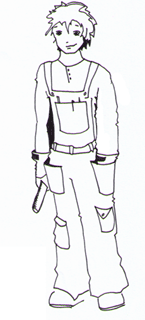7-Oct-2008
Mankell, Henning. 2003.
The man who smiled. London:
Harvill.
After being on sick leave for a year Inspector Kurt
Wallander decides to resign from the police force, but
then a lawyer he knows appeoaches him for help in
investigating the death of his father, who died in a car
crash, which had the police had ruled accidental. When
the lawyer is murdered a few days later, Wallander takes
on the case. .
16-Oct-2008
Hutton, Ronald. 2001.
The triumph of the moon: a history of
modern pagan witchcraft. Oxford: Oxford
University Press.
The first part deals with cultural currents in Britain
that led to the establishment of pagan witchcraft as a
new religious movement, and the second half is a history
of the movement itself, beginning with Gerald Gardner. .
23-Oct-2008
Huxley, Aldous. 1932.
Antic hay. New York: The
Modern Library.
Theodore Gumbril decides to throw up his job as a
schoolmaster to make money out of patent trousers with
inflatable seats. He meets Casimir Lypiatt, an
unsuccessful artist, and has dinner with his friends,
Pasteur Mercaptan, Shearwater, Coleman. They go out for
coffee and see Mrs Viveash, with whom most of them have
been in love at one time or another. Lypiatt is insulted
when Gumbril offers him the job of designing advertising
posters for his trousers, and contemplates suicide. .
30-Oct-2008
Hutton, Ronald. 1987.
The Restoration: a political and
religious history of England and Wales 1658-1667.
Oxford: Oxford University Press.
After the death of Oliver Cromwell Britain was
effectively run by a military junta. Richard Cromwell
tried to have a new parliament, but the army replaced it
with the old purged one, soon nicknamed the "rump". But
the army was not paid, and grew restive, and the country
could not afford it. Monck brought his army down from
Scotland, and a new parliament was elected, which then
voted for the restoration of Charles II. After an
initial period of reconciliation a Cavalier Parliament
was elected, which took a hard line with republicans and
religious dissenters. Charles II lost the confidence of
many for his adultery, and also for his foolishness in
pursuing an unnecessary and ruinous war against the
Dutch. .
5-Nov-2008
Rankin, Ian. 2006 [1993]
Witch hunt. London: Orion.
A terrorist known as the Witch is known to have entered
Britain, and MI5 agent Michael Barclay is asked to work
with retired agent Dominic Elder, who is called back
into service, to try to find her. .
22-Nov-2008
Woolf, Virginia. 1965.
A writer's diary: being extracts from
the diary of Virginia Woolf. London: Hogarth.
Extracts from Virginia Woolf's diaries, selected by her
husband Leonard Woolf. The extracts deal with her
reading and writing, and describe the progress of her
novels and other works in the period from 1919 to 1941,
when she died. Why is it that I often find diaries and
biographies of writers so much more interesting than the
books they write? Certainly the case with V. Woolf. I
tried reading her "Jacob's room", but gave up after a
few chapters. .
24-Nov-2008
Tracy, P.J. 2007.
Snow blind. London: Penguin.
A couple of New York detectives are investigating the
death of two of their collegues, whose bodies are found
in a park disguised as snowmen. They travel to
Connecticut through the snow to help with a murder case
there, little realising that the solution to their own
problem is tied up with it. .
27-Nov-2008
Maitland, Barry. 2000.
Silvermeadow. London: Orion.
A wanted criminal is seen in a new shopping mall in
Essex, and a few days later a girl's body is found in
some rubbish that originated in the mall. Detectives
Dave Brock and Kathy Kolla are asked to look into both
cases. .
2-Dec-2008
22 January 2007
Sayers, Dorothy L. 1934.
The nine tailors. San
Diego: Harvest.
After a car accident Lord Peter Wimsey and his servant
Bunter are stranded in the village of Fenchurch St Paul
on New Year's eve, and he is roped in to take the place
of one of the bellringers to ring in the new year. Then,
some months later a body is discovered in the
churchyard.
I seem to have been reading quite a lot of books set in the 1920s and 1930s in the last couple of months -- the Albert Huxley and Dorothy Sayers novels and Virginia Woolf's diary. so I've also been reading
The aspirin age, a series of essays about the period, though in the USA, while the others I have been reading were British.













